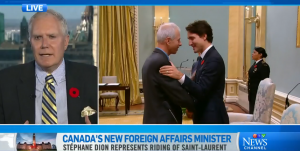CTV News Channel: Dion minister of foreign affairs
Trudeau’s foreign cabinet picks signal climate and trade priorities
By choosing Stéphane Dion as Foreign Minister, the new Prime Minister sends three messages. First, as a veteran of the Chrétien era and as a Quebecker, Mr. Dion’s appointment signals a return to a more pacific strain in Canadian foreign policy and a reluctance to become involved in foreign military entanglements. Mr. Dion will, with conviction, withdraw Canadian forces from the fight against the Islamic State. Future American presidents should expect a skeptical response when asking whether Canada is ready to join in the next military venture.Globe and Mail Update Nov. 04 2015, 1:23 PM EST
Unless, of course, that venture has been approved by the United Nations Security Council. Supporting the UN will once again be a priority of Canadian foreign policy, along with other multilateral forums such as the Commonwealth and la Francophonie. As well, expect a gradual rebalancing over time between the equal right of Israel to a secure existence and the Palestinian people to their own state.
Above all, combatting climate change is now a top foreign as well as domestic priority. In Paris next month, Mr. Dion will negotiate Canada’s renewed commitment to combat global warming. He, not Environment Minister Catherine McKenna, will head the cabinet committee on climate change. Fighting global warming has gone from last priority to first, as the federal government transitions from Conservative to Liberal.
Colin Robertson, a former diplomatic and current foreign-affairs analyst, observes that Canadian foreign policy has always balanced national interest with constructive internationalism. Under Mr. Harper, national interest held sway. “Stéphane Dion represents constructive internationalism,” said Mr. Robertson: a broad commitment to multilateral engagement, foreign aid (though little is known about the Minister of International Development, Marie-Claude Bibeau) and collective security.
But Canada’s stance won’t be entirely Pearsonian—far from it. Mr. Trudeau has signalled in the past his strong support for the new government in Ukraine, a position strongly buttressed by Chrystia Freeland, the new Minister of International Trade, whose background is partly Ukrainian. Canada under the Liberals will remain firmly committed to confronting Russian aggression and defending NATO’s eastern flank, a key priority under Stephen Harper.
(And by the way, Defence Minister Harjit Singh Sajjan has four tours of duty under his belt as a member of the Canadian Forces – three in Afghanistan and one in Bosnia – and will hardly be an isolationist voice in cabinet.)
Ms. Freeland can also be expected to aggressively pursue and expand upon the trade priorities of the Harper government. Her first order of business will be to ratify the trade agreements the Conservatives negotiated with the European Union and the 11 nations of the Trans Pacific Partnership. She will seek to improve trade relations with China, while also pursuing other Asian and Pacific opportunities.
“He’s picked a very high-profile trade minister, who is articulate, savvy, with an international reputation,” observes Fen Hampson, director of the Global Security and Politics program at the Centre for International Governance Innovation.
Many diplomats privately complained that, under the Conservatives, trade issues overwhelmed foreign policy. They hoped that with the Liberals back in charge trade would be returned to the back burner, Mr. Hampson observed. But by combining the veteran Mr. Dion with the aggressive newcomer Mr. Freeland, Mr. Trudeau is choosing not to choose between the Chrétien and Harper legacies.
“I think it’s going to be a bit of both,” said Mr. Hampson. “It’s going to be salt and pepper.”
Along with substance, expect also a change of style, an urbane cosmopolitanism that had gone missing in the Harper years and that will emphatically be back under this new team. Everyone who is anyone will be visiting Ottawa for an earnest discussion with (or lecture from) Mr. Dion, a scintillating debate with Ms. Freeland, and a quiet but elegant dinner with Mr. Trudeau.
If style matters as much as substance in foreign affairs, then that could be the biggest change of all.

